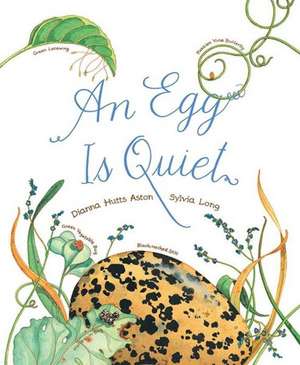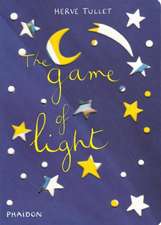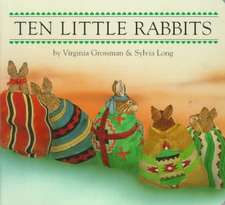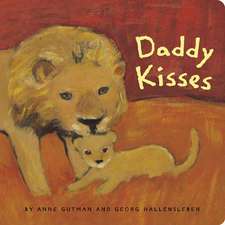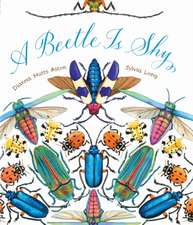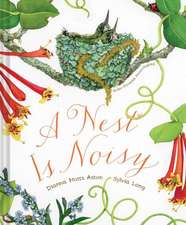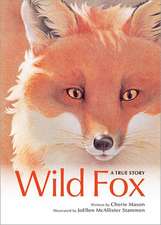An Egg Is Quiet:
Autor Dianna Aston Ilustrat de SYLVIA LONGen Limba Engleză Paperback – 28 feb 2014 – vârsta de la 5 până la 8 ani
Vezi toate premiile Carte premiată
Flicker Tale Children's Book Award (2007), Texas 2x2 Reading List (2007), South Carolina Childrens, Junior and Young Adult Book Award (2008)
| Toate formatele și edițiile | Preț | Express |
|---|---|---|
| Paperback (1) | 36.30 lei 22-36 zile | +11.00 lei 6-12 zile |
| Chronicle Books – 28 feb 2014 | 36.30 lei 22-36 zile | +11.00 lei 6-12 zile |
| Hardback (1) | 100.59 lei 22-36 zile | |
| Chronicle Books – 29 apr 2006 | 100.59 lei 22-36 zile |
Preț: 36.30 lei
Preț vechi: 38.89 lei
-7% Nou
Puncte Express: 54
Preț estimativ în valută:
6.95€ • 7.55$ • 5.84£
6.95€ • 7.55$ • 5.84£
Carte disponibilă
Livrare economică 31 martie-14 aprilie
Livrare express 15-21 martie pentru 20.99 lei
Preluare comenzi: 021 569.72.76
Specificații
ISBN-13: 9781452131481
ISBN-10: 1452131481
Pagini: 36
Dimensiuni: 224 x 272 x 5 mm
Greutate: 0.2 kg
Editura: Chronicle Books
ISBN-10: 1452131481
Pagini: 36
Dimensiuni: 224 x 272 x 5 mm
Greutate: 0.2 kg
Editura: Chronicle Books
Descriere
beautifully simple introduction to eggs of all kinds; from tiny hummingbird eggs to giant ostrich eggs, from fossilised dinosaur eggs to gooey fish eggs, it's an entirely fresh look at the familiar.Attractive and informative, this will find a home in classrooms and Easter baskets alike
Notă biografică
Dianna Aston is the founder of her non-profit foundation, The Oz Project, and also an annual teen writers workshop for underprivileged teens in Mexico.Sylvia Long is the illustrator of many best-selling books for children. Her detailed paintings are inspired by her love of animals and the outdoors.
Recenzii
Like the subject matter it describes, this book packages with understated elegance the substantive matter found within it. "An egg is quiet. It sits there, under its mother's feathers...on top of its father's feet...buried beneath the sand," Aston ("When You Were Born") begins, as spot illustrations zero in on a hummingbird, emperor penguin and sea turtle, respectively. The narrative then launches into a kind of survey about the characteristics of eggs, which follows a simple format. In most spreads, different adjectives (colorful, shapely, textured, etc.) complete the sentence, "An egg is....." This repetitive rhythm contrasts with the visual variety of the illustrations. Long's ("Sylvia Long's Mother Goose") skilled use of contrast and compositional balance prevent monotony. For example, a border that resembles a color test pattern runs down the outer edges of a spread of nearly 40 carefully placed "colorful" examples, set against a white background, which dazzle the eye. The main text appears in large, flowery cursive, while a smaller printed typeface serves as labels and brief factual captions. "An egg is clever," in fancy script, for instance, sits alongside examples of camouflage: "An egg might be speckled to resemble the rocks around it." The letters' dramatic curlicues mimic curvy grasses and vines dappled with tiny insect eggs. Long introduces breathtaking color into the final spreads, as a concluding scene "hatches from" this peacefulness, reminding readers of an egg's purpose. This attractive volume pleases on both an aesthetic and intellectual level. -"Publishers Weekly," starred review "Worthy successor to Ruth Heller's Chickens Aren't The Only Ones (1981), this engrossing album pairs images of dozens of precisely detailed eggs and their diverse wild parents to basic facts presented in neatly hand-lettered lines. Nearly all depicted actual size (and those that aren't, are consistently so labeled), Long's eggs look real enough to pick up, whether plac
Like the subject matter it describes, this book packages with understated elegance the substantive matter found within it. "An egg is quiet. It sits there, under its mother's feathers...on top of its father's feet...buried beneath the sand," Aston ("When You Were Born") begins, as spot illustrations zero in on a hummingbird, emperor penguin and sea turtle, respectively. The narrative then launches into a kind of survey about the characteristics of eggs, which follows a simple format. In most spreads, different adjectives (colorful, shapely, textured, etc.) complete the sentence, "An egg is....." This repetitive rhythm contrasts with the visual variety of the illustrations. Long's ("Sylvia Long's Mother Goose") skilled use of contrast and compositional balance prevent monotony. For example, a border that resembles a color test pattern runs down the outer edges of a spread of nearly 40 carefully placed "colorful" examples, set against a white background, which dazzle the eye. The main text appears in large, flowery cursive, while a smaller printed typeface serves as labels and brief factual captions. "An egg is clever," in fancy script, for instance, sits alongside examples of camouflage: "An egg might be speckled to resemble the rocks around it." The letters' dramatic curlicues mimic curvy grasses and vines dappled with tiny insect eggs. Long introduces breathtaking color into the final spreads, as a concluding scene "hatches from" this peacefulness, reminding readers of an egg's purpose. This attractive volume pleases on both an aesthetic and intellectual level. -"Publishers Weekly," starred review "Worthy successor to Ruth Heller's Chickens Aren't The Only Ones (1981), this engrossing album pairs images of dozens of precisely detailed eggs and their diverse wild parents to basic facts presented in neatly hand-lettered lines. Nearly all depicted actual size (and those that aren't, are consistently so labeled), Long's eggs look real enough to pick up, whether plac
Like the subject matter it describes, this book packages with understated elegance the substantive matter found within it. "An egg is quiet. It sits there, under its mother's feathers . . . on top of its father's feet . . . buried beneath the sand," Aston ("When You Were Born") begins, as spot illustrations zero in on a hummingbird, emperor penguin and sea turtle, respectively. The narrative then launches into a kind of survey about the characteristics of eggs, which follows a simple format. In most spreads, different adjectives (colorful, shapely, textured, etc.) complete the sentence, "An egg is . . . ." This repetitive rhythm contrasts with the visual variety of the illustrations. Long's ("Sylvia Long's Mother Goose") skilled use of contrast and compositional balance prevent monotony. For example, a border that resembles a color test pattern runs down the outer edges of a spread of nearly 40 carefully placed "colorful" examples, set against a white background, which dazzle the eye. The main text appears in large, flowery cursive, while a smaller printed typeface serves as labels and brief factual captions. "An egg is clever," in fancy script, for instance, sits alongside examples of camouflage: "An egg might be speckled to resemble the rocks around it." The letters' dramatic curlicues mimic curvy grasses and vines dappled with tiny insect eggs. Long introduces breathtaking color into the final spreads, as a concluding scene "hatches from" this peacefulness, reminding readers of an egg's purpose. This attractive volume pleases on both an aesthetic and intellectual level. -"Publishers Weekly," starred review
"Worthy successor to Ruth Heller's Chickens Aren't The Only Ones (1981), this engrossing album pairs images of dozens of precisely detailed eggs and their diverse wild parents to basic facts presented in neatly hand-lettered lines. Nearly all depicted actual size (and those that aren't, are consistently so labeled), Long's eggs look real enough to pick up, w
Like the subject matter it describes, this book packages with understated elegance the substantive matter found within it. "An egg is quiet. It sits there, under its mother's feathers...on top of its father's feet...buried beneath the sand," Aston ("When You Were Born") begins, as spot illustrations zero in on a hummingbird, emperor penguin and sea turtle, respectively. The narrative then launches into a kind of survey about the characteristics of eggs, which follows a simple format. In most spreads, different adjectives (colorful, shapely, textured, etc.) complete the sentence, "An egg is....." This repetitive rhythm contrasts with the visual variety of the illustrations. Long's ("Sylvia Long's Mother Goose") skilled use of contrast and compositional balance prevent monotony. For example, a border that resembles a color test pattern runs down the outer edges of a spread of nearly 40 carefully placed "colorful" examples, set against a white background, which dazzle the eye. The main text appears in large, flowery cursive, while a smaller printed typeface serves as labels and brief factual captions. "An egg is clever," in fancy script, for instance, sits alongside examples of camouflage: "An egg might be speckled to resemble the rocks around it." The letters' dramatic curlicues mimic curvy grasses and vines dappled with tiny insect eggs. Long introduces breathtaking color into the final spreads, as a concluding scene "hatches from" this peacefulness, reminding readers of an egg's purpose. This attractive volume pleases on both an aesthetic and intellectual level. -"Publishers Weekly," starred review "Worthy successor to Ruth Heller's Chickens Aren't The Only Ones (1981), this engrossing album pairs images of dozens of precisely detailed eggs and their diverse wild parents to basic facts presented in neatly hand-lettered lines. Nearly all depicted actual size (and those that aren't, are consistently so labeled), Long's eggs look real enough to pick up, whether plac
Like the subject matter it describes, this book packages with understated elegance the substantive matter found within it. "An egg is quiet. It sits there, under its mother's feathers . . . on top of its father's feet . . . buried beneath the sand," Aston ("When You Were Born") begins, as spot illustrations zero in on a hummingbird, emperor penguin and sea turtle, respectively. The narrative then launches into a kind of survey about the characteristics of eggs, which follows a simple format. In most spreads, different adjectives (colorful, shapely, textured, etc.) complete the sentence, "An egg is . . . ." This repetitive rhythm contrasts with the visual variety of the illustrations. Long's ("Sylvia Long's Mother Goose") skilled use of contrast and compositional balance prevent monotony. For example, a border that resembles a color test pattern runs down the outer edges of a spread of nearly 40 carefully placed "colorful" examples, set against a white background, which dazzle the eye. The main text appears in large, flowery cursive, while a smaller printed typeface serves as labels and brief factual captions. "An egg is clever," in fancy script, for instance, sits alongside examples of camouflage: "An egg might be speckled to resemble the rocks around it." The letters' dramatic curlicues mimic curvy grasses and vines dappled with tiny insect eggs. Long introduces breathtaking color into the final spreads, as a concluding scene "hatches from" this peacefulness, reminding readers of an egg's purpose. This attractive volume pleases on both an aesthetic and intellectual level. -"Publishers Weekly," starred review
"Worthy successor to Ruth Heller's Chickens Aren't The Only Ones (1981), this engrossing album pairs images of dozens of precisely detailed eggs and their diverse wild parents to basic facts presented in neatly hand-lettered lines. Nearly all depicted actual size (and those that aren't, are consistently so labeled), Long's eggs look real enough to pick up, w
Premii
- Flicker Tale Children's Book Award Winner, 2007
- Texas 2x2 Reading List Recommended, 2007
- South Carolina Childrens, Junior and Young Adult Book Award Nominee, 2008
- Beehive Awards Nominee, 2008
- Capitol Choices: Noteworthy Books for Children and Teens Recommended, 2007
- Grand Canyon Reader Award Nominee, 2009
- North Carolina Children's Book Award Nominee, 2009
- Cybils Winner, 2006
